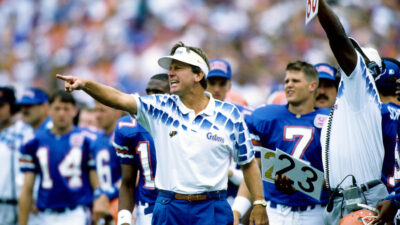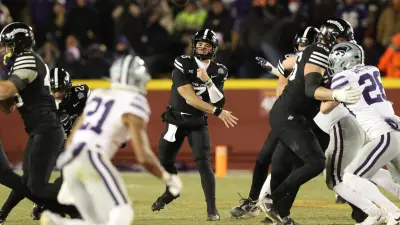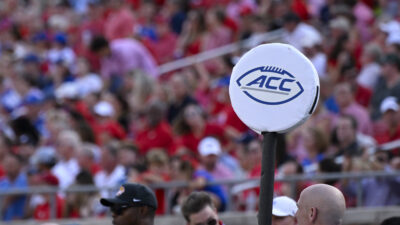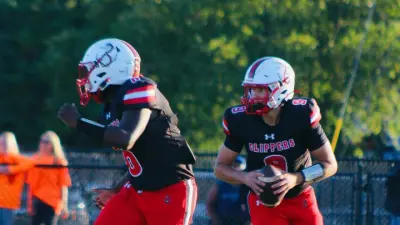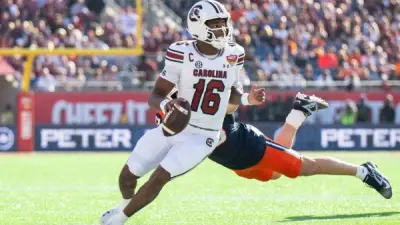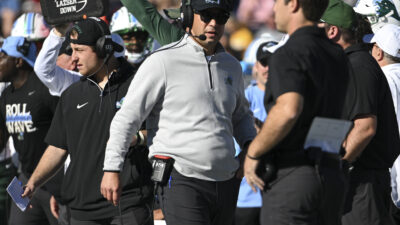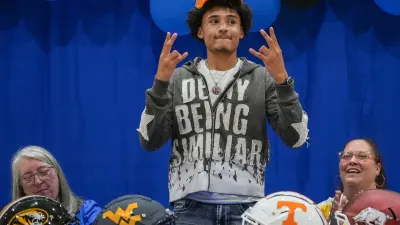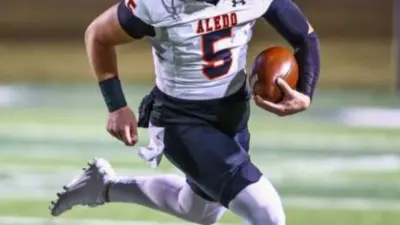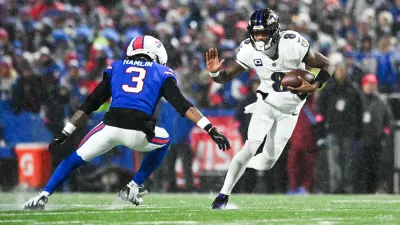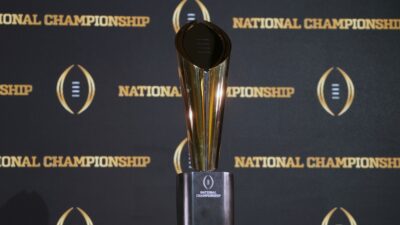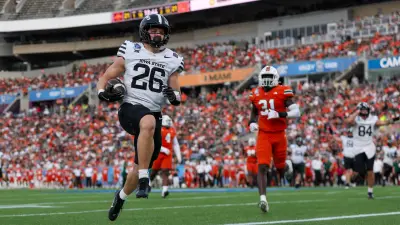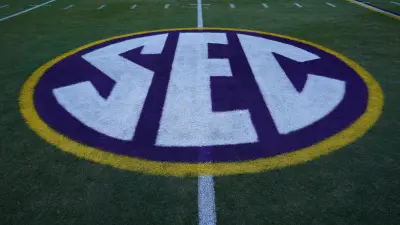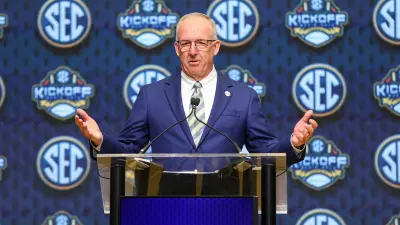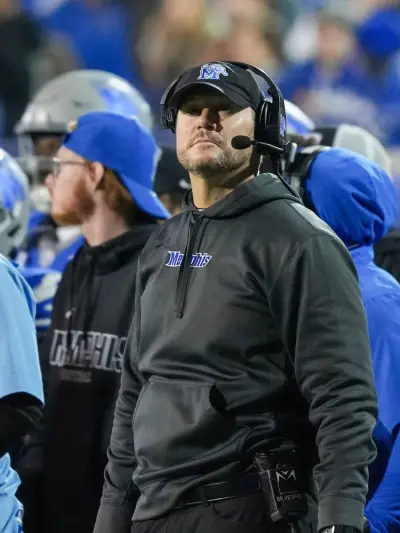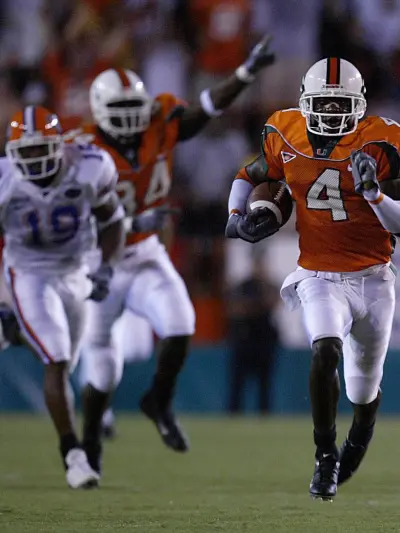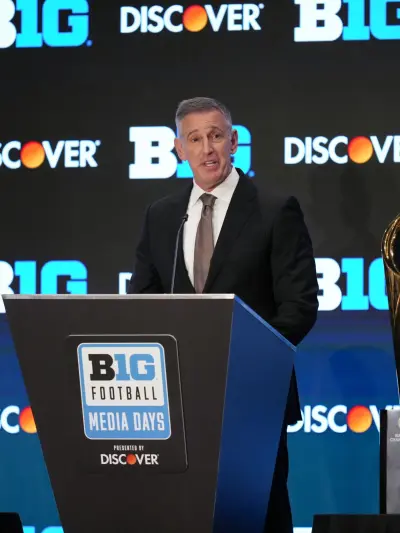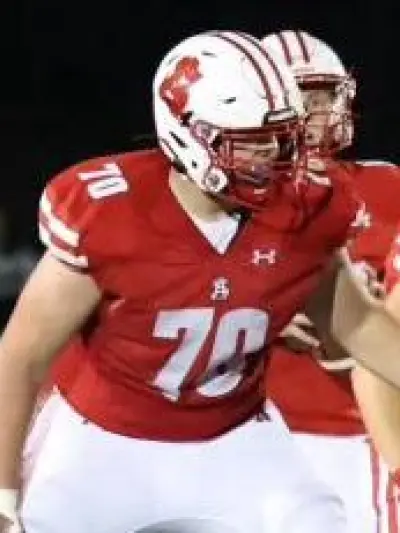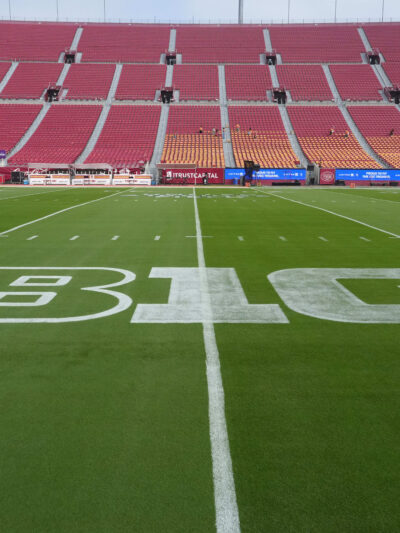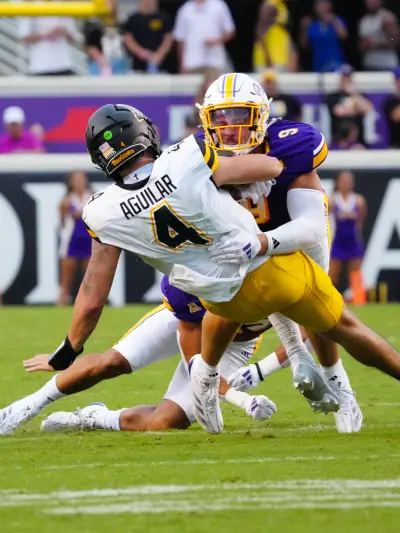What if social media was prevalent and mainstream as it is today in the 1990’s, how big would Steve Spurrier have been as a head coach?
Spurrier had more iconic one-liners than some of pro wrestling’s most iconic figures like “The Nature Boy” Ric Flair, “The American Dream” Dusty Rhodes, or even “The Hot Rod” “Rowdy” Roddy Piper. In today’s terms, he had as many one-liners to fill a greatest hits album of diss tracks that would go platinum.
Spurrier’s Gators squads backed up his bravado on the field, winning five SEC Championships (officially) in the 1990s, playing in seven of the first nine SEC Conference Championship Games, winning five of his seven SEC Coach of Year awards in the 1990s, and led Florida to its first national championship in 1996.
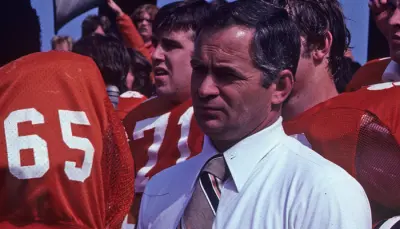
Picking Up the Pieces
During the mid-1980s, Florida, under Charley Pell, began to flirt with top programs in the country.
In 1983, Pell guided Florida to its first-ever Top 10 finish in school history. Most felt that Pell had fully rebuilt Florida, after leaving Clemson in 1978 after a 10-1 season, was on the verge of joining Miami and Florida State, who had major monumental wins and seasons under Howard Schnellenberger and Bobby Bowden.
However, during Pell’s greatest success, the NCAA was investigating Florida for gross misconduct in its football program. As the 1984 season opened, it came out Florida was in violation of 107 infractions ranging from paying players, spying on the opposition, and impermissible benefits for walk-ons.
More Sports News
Pell was immediately terminated, leaving offensive coordinator Galen Hall to pick up the pieces.
While Hall was able to have immediate success in 1984 and 1985, winning the program’s first two SEC Championships (later vacated by the SEC due to being ineligible), scholarship reductions doomed Hall, and he was never able to realize their full potential.
When Hall got into hot water for paying his assistant coaches out of his own pocket, he was forced to resign. Spurrier, who was coaching at Duke, took notice and spoke privately about his interest in returning to coach Florida.
The interest started to become mutual as Spurrier rode the momentum of a 21-17 upset win against Clemson that fall and won his next seven conference games, clinching a share of the 1989 ACC Championship, the program’s first since 1962 and last one the program has won.
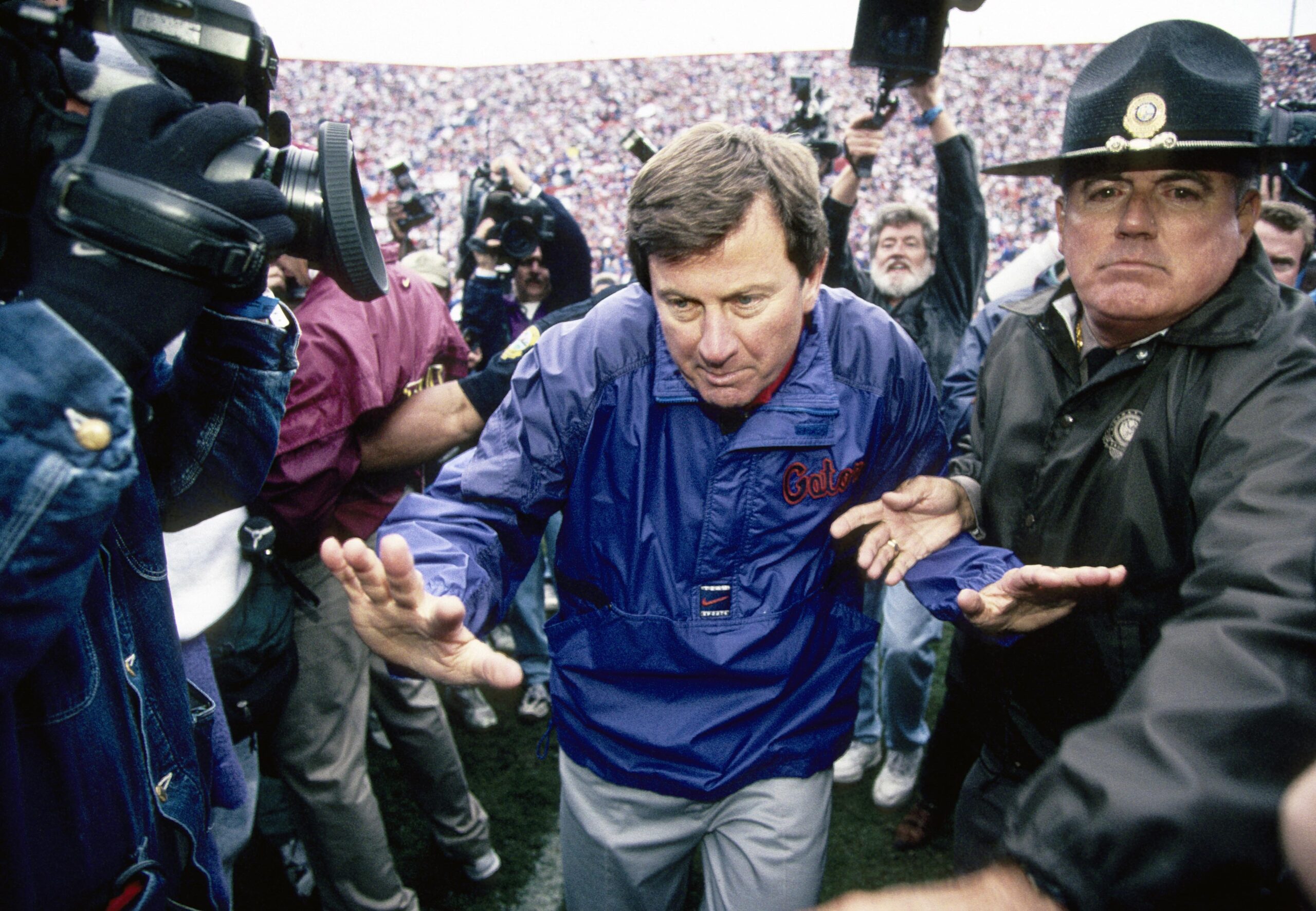
Fun ‘N Gun
Spurrier accepted the Florida job on December 31, 1989, returning the 1966 Heisman Trophy winner back to his alma mater. He brought with him a swagger that Florida and the SEC hadn’t seen up to that point.
The first part was his offensive strategy, later dubbed the “Fun ‘N Gun.”
Spurrier preferred to break defenses by passing first, something that wasn’t emphasized in the SEC at the time. During the 1980s, Vanderbilt led the SEC in passing while finishing within one of the worst records in the conference, and in 1989 LSU led the SEC in passing but went 4-7 during the process.
“The guy who said defense wins championships hasn’t watched us a lot.”
– Steve Spurrier
The Fun ‘N Gun offense was an offshoot of the Run and Shoot offenses that were prevalent with the Houston teams in the Southwest Conference, with Heisman Trophy winner Andre Ware being the prime example.
Spurrier’s offense, however, had a few key differences: It emphasized a pass-first approach, utilized a lot of receiver motion, and asked both the quarterback and receivers to adjust on the fly to defenses. It was primarily operated out of the shotgun formation, with the running back in the sidecar next to the quarterback.
Spurrier would quip about his offenses, “The guy who said defense wins championships hasn’t watched us a lot.”
But it wasn’t just his schemes that frustrated his opponents. Spurrier’s zingers to the opposing teams and coaches – especially the Gators’ rivals – drew the ire of many.
At Duke, Spurrier used to needle rival North Carolina and went 3-0 against the Tar Heels. His last jab still stings to this day after Duke routed North Carolina 41-0. Following the game, Spurrier had his Duke team line up for a team photo in front of the scoreboard.
A New Era of SEC Football
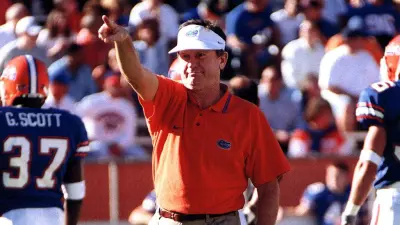
One of Spurrier’s first major tests came against Alabama in his second game ever at Florida.
The Crimson Tide had started 10-0 the previous season and were eyeing a potential national championship matchup in the Sugar Bowl against Miami. The Tide traveled for the first time to Auburn for the Iron Bowl, and it was a giant trap game for the Crimson Tide in more ways than one.
Auburn coach Pat Dye was as old school as they came as a head coach, had a few pass plays he called that shocked the Crimson Tide defense. The surprise aided Auburn in their 30-20 upset of Alabama.
The Crimson Tide lost the Sugar Bowl against Miami, the final game of Bill Curry’s time at Alabama. In new head coach Gene Stallings’ first game as Alabama head coach, the Tide was upset by Brett Favre and Southern Miss 27-24. The Florida game had huge importance as the Crimson Tide was looking to avoid their first four-game losing streak since 1956.
The game had a little heightened importance, not just for Stallings to avoid the losing streak. It would be an ideological difference between Stallings’ run first and physically dominating the opposition and Spurrier’s Fun ‘N Gun that ran past Oklahoma State 50-7 in Week 1.
Alabama had set the tone early, controlling the line of scrimmage, and took a 10-0 lead early. It would be Spurrier’s second-half adjustments that allowed quarterback Shane Matthews to be more efficient in the second half. Matthews would lead a key third quarter drive where he took the Gators on a 10-play, 67-yard drive connecting with Terrence Barber for a six-yard score to cap it off.
On the ensuing Florida possession, Matthews marched Florida on a 92-yard drive that ran out of steam but tied the game up at 10.
Early in the fourth quarter, Florida special teamer Jimmy Spencer blocked an Alabama punt that led to a Florida touchdown. Alabama would make it 17-13 but wouldn’t get any closer.
The 17-13 win was the ideal initial foundational block of the Spurrier Era in Florida. It also set the tone for a budding rivalry with Alabama, as both teams would square off in four of the first five SEC Championship Games.
Spurrier would always jab the Crimson Tide every chance he got, notably saying, “In 12 years at Florida, I don’t think we ever signed a kid from the state of Alabama. Of course, we found out later that the scholarships they were giving out at Alabama were worth a whole lot more than ours.”
On its final year of probation, Florida finished with the best record in the SEC and were unofficially crowned SEC Champions.
That year, Tennessee won the official conference championship, a slight that irked Spurrier during his time in Gainesville, on top of a 45-3 loss in a Top 10 matchup that the Gators turned the ball over six times.
During the 1990’s Spurrier went 7-3 against Tennessee. His favorite pastime during that time (other than golf) was needling the Vols with one-liners.
Following Peyton Manning’s announcement he was returning to school for a senior season, Spurrier quipped, “I know why Peyton came back for his senior year. He wanted to be a three-time star of the Citrus Bowl.”
It would also be the 1997 game, where the spelling of the word ‘citrus’ would have a new meaning to “The Third Saturday in September Rivalry.”
At the time, the largest crowd in Ben Hill Griffin Stadium history saw a clash of Top 4 teams, with Manning looking to get his first win against Florida. While Manning had 353 yards and three touchdowns on the day, but a relentless Florida defense wreaked havoc against Tennessee.
The Gators got the win 33-20, and it was the only regular season loss for Tennessee that season. They went on to play Nebraska for an opportunity for a national championship.
Manning would say after the defeat, “It bothers me that we never did beat Florida, but hey, I can’t control the way other people view Tennessee or view my career; I’m sure coach Spurrier will go make a few more jokes, that’s fine. He’s got a good ballclub.”
This would be the game that would forever be known for the Spurrier jab, “You can’t spell Citrus without the U-T.”
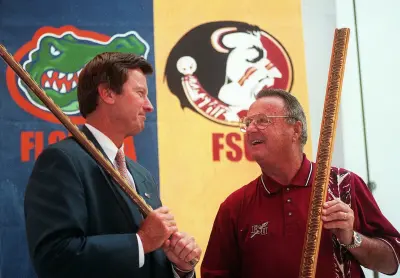
Sunshine State Showdowns
Throughout the early part of the 1990’s, Florida would be in the Top 10 but had a problem overcoming Bobby Bowden and the Florida State Seminoles. Bowden was in the midst of his Top 4 ranking run (1987 to 2000) and seeking a national championship of his own, winning three of the first four against Spurrier.
Early in 1994, Florida State was engulfed in a scandal unearthed by Sports Illustrated which sports agents took several Florida State football players on a $6,000 shopping spree at a local Foot Locker sporting goods store. The agents provided the players with free shoes, clothing, and cash.
Spurrier couldn’t resist and landed one of his most famous zingers, “You know what FSU stands for, don’t you? Free Shoes University.”
Bowden took the zinger in jest and was asked about it during the 1994 FSU/Florida game:
The Seminoles, who trailed 31-3, got the last laugh on the Gators that day as they rallied back with four fourth-quarter touchdowns to force a 31-31 tie.
It was arguably the worst defeat Spurrier endured, even though it wasn’t technically a loss. To blow a 28-point lead at home in the final quarter was hard to swallow
The Sunshine Showdown was very much a high-stakes showdown in the 1990s, and in the middle part of the decade, the stakes couldn’t be any higher.
Between 1994 and 1996, Florida State and Florida played five times, including two games in the Sugar Bowl. The teams split these high-stakes matchups 2-2-1, with the tie being the “Choke at the Doak.”
The 1995 Sugar Bowl was billed as “The Fifth Quarter in the French Quarter.” After a sluggish start, the Seminoles exploded with a 17-point second quarter that ended up being the difference in the game.
The feeling of back-to-back defeats was the fuel for the 1995 Florida Gators. The schedule consisted of three Top 10 matchups against Tennessee, Auburn, and Florida State.
It seemed, heading into the annual “Third Saturday in September” game against Tennessee, it would have a Top 10 flair to it, with Peyton Manning trying to get over the hump.
In the first half, Tennessee looked like they were going to get an elusive win over Florida, taking advantage of a pair of Gator turnovers and a stunned crowd, Tennessee led 30-14.
Then a sea change happened when Florida quarterback Danny Wuerffel led Florida to 48 unanswered points leaving the Volunteers bewildered in a 62-37 win. Wuerffel finished with a record-setting day, completing 29 of 39 passes for 381 yards and six touchdown passes.
Florida traveled to Jordan Hare Stadium the following month to face No. 7 Auburn. Auburn drew the ire of Spurrier by defeating them in 1993 and 1994, costing the Gators potential chances to position themselves for the elusive national championship.
A monster second quarter by Wuerffel and big games from wide receivers Ike Hilliard and Chris Doering helped Florida to a 49-38 win in a very hostile environment.
Although Spurrier went 8-2 against Auburn during the 1990s, he still made sure to save some of his best quips for the Tigers. When a fire claimed 20 books at the library at Auburn, Spurrier couldn’t resist, “The real tragedy was that 15 hadn’t been colored yet.”
What separated Spurrier from getting Florida to their first national championship was Florida State in the regular season finale. The Gators were trying to erase any memory of last season’s “Choke at the Doak.
The Gators were on point that day as their defense was opportunistic, forcing three interceptions from Florida State Seminole quarterback Danny Kanell. Florida quarterback Danny Wuerffel overcame seven Seminole sacks by completing 25 passes on 40 attempts for 443 yards and four touchdowns in a 35-24 win.
So Close, Yet So Far
The stage was set for Florida to play for their first national championship against the defending national champion Nebraska Cornhuskers, who had won 24 games in a row largely behind quarterback Tommie Frazier.
If the “Choke at the Doak” wasn’t the worst defeat, the other legitimate contender has to be the 1996 Fiesta Bowl.
Some in the media felt Florida could pull off the upset, and early in the game, it looked that just might happen. Nebraska was not in sync, and the Gators climbed to an early 10-6 lead.
What Florida administered to Tennessee in their 48-point avalanche was returned by the Huskers in the Fiesta Bowl, as they enjoyed a 29-point second quarter and 36 unanswered points. This was highlighted by Nebraska running back Lawrence Phillips‘ 42-yard touchdown to start the explosion and Frazier’s 75-yard touchdown run, where he broke at least seven Gator tackles.
The 62-24 drubbing left a sour taste in the mouth of every Gator, and Spurrier did not hold back,
“I apologize that we didn’t do better, they’re too good for us. They clobbered us up and down the field. They’re the best team I’ve seen in my six years with Florida. They beat us every way. They’re just too good. Give ’em credit.
“We had trouble tackling anybody from Nebraska. We did not come to play, apparently. I’m embarrassed. We were outmatched.”
– Steve Spurrier in response to the Gators’ performance in the 1996 Fiesta Bowl
The disappointment was motivation enough for what was Spurrier’s finest team in 1996.
Entering the season, the Gators were led by Wuerffel, who was a prohibitive favorite to win the Heisman Trophy. Wide receivers Ike Hilliard and Reidel Anthony were Consensus All-Americans, and running back Fred Taylor became one of the country’s best.
Florida fielded a defense that consisted of future SEC Defensive Player of the Year Jevon Kearse, all-conference defensive lineman Reggie McGrew, All-American linebacker Mike Peterson, and athletic defensive backs in Jim Thorpe Award winner Lawrence Wright and All-American Fred Weary.
The Gators got off to a strong start, defeating No. 2 Tennessee in Neyland Stadium 35-29, where the game wasn’t as close as the score indicated.
Florida would assume the No. 1 ranking and took that into the regular season finale against No. 2 Florida State at Doak Campbell Stadium. It would mark the first time both teams would be undefeated going against each other in a No. 1 vs. No. 2 matchup.
The Seminoles set the tone, going up 17-0 early against the Gators. Florida State was fueled that day by Warrick Dunn, who had a career-best 185 yards in the contest.
Florida began to claw their way back, getting the score to 17-14. Wide receiver Reidel Anthony had a career day with 11 receptions and 193 yards, but it was the Seminoles’ pass rush that forced three interceptions and had six sacks on Wuerffel that did Florida in, losing 24-21.
After Florida won the SEC Championship Game against Alabama 45-30, it set up another rematch with Florida State in the Sugar Bowl. The rivals would meet in New Orleans for the second time in three seasons.
If the ghosts of 1995 were present for Florida, they seemingly were exorcised. Spurrier shifted Wuerffel to the shotgun to operate, and he seemingly had all the time in the world to pick apart a Florida State defense that had allowed up to that point only 11 points per game.
Wuerffel put together a game going 18 for 34 for 306 yards and three touchdowns. Ike Hilliard was the recipient of all three Wuerffel touchdowns in a 52-20 rout of the Seminoles.
Listening to Bobby Bowden’s postgame tells all about the domination by Florida in the Sugar Bowl:
The 1996 Gators was Spurrier’s opus, and they are amongst the most dominant teams in SEC history, where they outscored nine SEC opponents, 421-142, an average of 46.8 to 15.8.
Continued Success
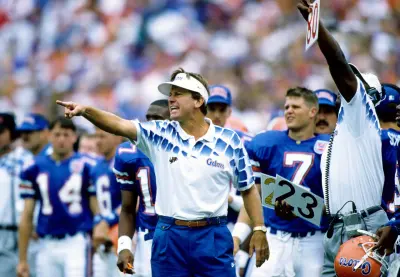
While Spurrier did not win another national championship at Florida, it wasn’t without any big-time moments.
Some feel his coaching performance in the 1997 Florida State game was one of his finest as a coach. The game is known as “The Greatest Game Ever Played In The Swamp.”
The Gators came into the contest against the top-ranked Seminoles as a double-digit underdog. That year, they struggled to find the right replacement for the now-graduated Wuerfful, juggling Noah Brindise and Doug Johnson on a drive-to-drive, and sometimes even a snap-to-snap, basis.
Spurrier would quip that the system made only sense to him and was forcing Florida State defensive coordinator Mickey Andrews to scheme differently on every play.
While the Seminoles had demonstrated the ability to dominate in the first half, Florida inched back and made it close. After Sebastian Janikowski kicked a field goal to extend Florida State’s lead to 29-25, what happened next will forever be immortalized in Florida football history.
Florida would go on a three-play, 80-yard drive, highlighted by Florida wide receiver Jacquez Green burning Florida State defensive back Samari Rolle on a hitch-and-go route, setting Florida up in the red zone.
Fred Taylor went off-tackle from the two-yard line into the end zone two plays later to give the Gators a 32-29 lead.
When Florida linebacker Dwayne Thomas secured the game-clinching interception, it sent The Swamp into euphoria, and some feel the loudest Ben Hill Griffin Stadium ever was.
Spurrier’s last coaching opus of the decade came against No. 2 Tennessee in the 1999 edition of “The Third Saturday in September.”
Tennessee had an epic win the previous season, their first against Florida since “The Downpour” game in 1992. The Vols were also reigning national champions – not Citrus Bowl champions.
Early in the clash, Florida had two costly turnovers that gave Tennessee short fields, and Phil Fulmer’s squad capitalized, running out to a 14-0 lead.
Yet, the Gator defense clamped down on the Vols offense, giving them fits throughout the contest. When the Gators needed key stops late in the fourth quarter, it stuffed Tennessee running back Jamal Lewis.
The 23-21 win was another signature win for Spurrier, who simply couldn’t resist another subtle shot at the Volunteers saying, “Tennessee’s going to be Tennessee.”
Living Legend
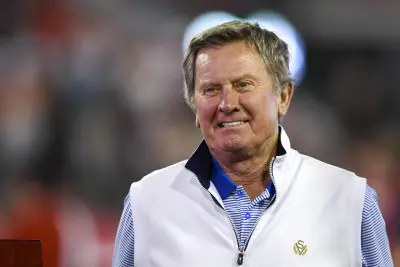
What made Spurrier a legend was his ability to win the biggest of games, especially rivalry games.
Against Florida’s three primary SEC rivals, Florida went 6-3 against Alabama (including 3-2 in SEC Championship Games), 7-3 against Tennessee, and 9-1 against Georgia.
Even with his dominance against Georgia, Spurrier couldn’t resist throwing shade at the Bulldogs, notably saying, “I don’t know. I sort of always like playing [Georgia] that second game because you could always count on them having two or three key players suspended.”
His biggest foe was Florida State. They met 12 times in the decade, with Spurrier only winning four of the matchups (4-7-1). Each of those games was a Top 10 matchup, and in four of the games, one of the two rivals was ranked No. 1 in the country.
During the decade, Florida played 32 contests against Top 10 teams and went 18-13-1 in those games.
Spurrier’s ability to realize the potential of Florida with its fertile recruiting base, coupled with his modernization of SEC offenses, makes him one of the true legends of the game. And being one of the sport’s most charismatic and polarizing figures while winning more than his fair share of big games doesn’t hurt his case either.
The Old Ball Coach remains one of the most memorable – and best – coaches of not just the 1990s, but in the history of the game.
